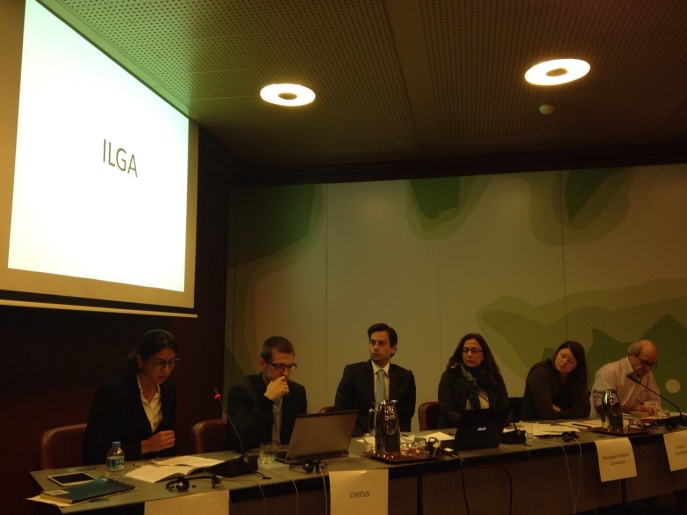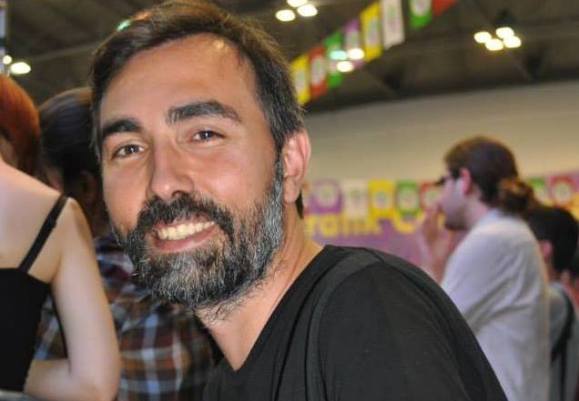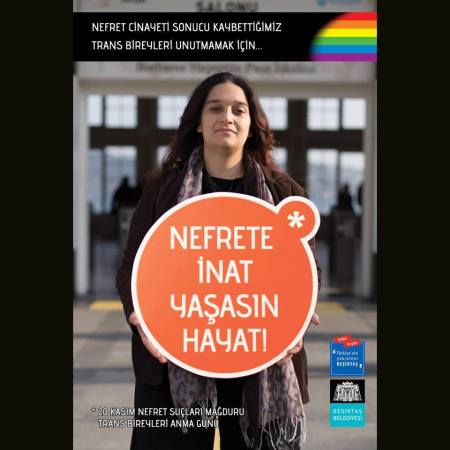Statement delivered by LGBTI News Turkey’s Zeynep Bilginsoy on December 3, 2014 in Geneva to Permanent Missions to the United Nations on behalf of Kaos GL, LGBTI News Turkey, IGLHRC, and ILGA World at Pre-Session event hosted by UPR Info.
Dear colleagues and representatives of the Permanent Missions,
Thank you for giving us the opportunity to be part of this session and to present the situation of lesbian, gay, bisexual, and trans individuals in Turkey. This statement is delivered on behalf of a coalition of Turkish and international LGBT rights groups that have been engaged in the UPR process with the submission of a report entitled “Human Rights Violations of LGBT Individuals in Turkey”.

Although the National Report of Turkey states that a consultation meeting took place on 27 February 2014, none of the eight officially registered LGBT associations were invited to this meeting.
We believe that recommendations during the UPR review of Turkey can specifically help the LGBT community in Turkey in areas such as (1) right to life, non-discrimination, and administration of justice and (2) refugees and asylum-seekers.
(1) Right to life, non-discrimination, and administration of justice
“LGBT is a behaviour that is outside the bounds of normality” Türkan Dağoğlu, Istanbul MP and Deputy President of the Parliamentary Committee on Health, Family, Labor, and Social Affairs, 2013
Between 2010 and June 2014, 41 individuals have been killed due to their real or perceived sexual orientation or gender identity. Moreover, several incidents of gun and physical-assault-related injuries, fatal lynchings and rape cases have also been reported throughout this period of time.
Due to the fact that sexual orientation and gender identity are not recognised as categories protected under anti-hate crime legislations, there is a lack of official data on instances of hate crimes. As a result, the number of deaths is estimated to be far higher. Besides, the fear of humiliation and undignified treatment that LGBT persons face throughout the legal process, along with concerns about revealing the survivor’s sexual orientation and gender identity to the public, are among the factors that prevent many LGBT individuals from seeking justice through the court.
Although Turkish legal codes do not explicitly discriminate against individuals on the basis of their sexual orientation or gender identity, the applications of existing laws by Turkey’s Judiciary is often discriminatory against LGBT individuals. Even worse, the perpetrators of anti-LGBT hate crimes can benefit from penalty reductions stipulated as part of “unjust provocation” regulations. Given the absence of any legal protection for individuals subjected to hate crimes based on sexual orientation and/or gender identity, and considering the biased application of the laws to the advantage of perpetrators of crimes against LGBT individuals, it is of utmost importance for the Republic of Turkey to consider offering comprehensive legal protection for LGBT individuals a top priority.
Follow-up to the First Review
At the first-cycle of the Universal Periodic Review of Turkey in 2010, several states raised concerns and put recommendations to the Government relating to non-discrimination based on sexual orientation and gender identity.
The Turkish government accepted recommendations by Norway, Canada and the Netherlands (100.33, 102.11, 102.12) and therefore committed to take steps to eliminate discrimination based on sexual orientation and gender identity. Paradoxically, the government rejected similar non-discrimination recommendations by the Czech Republic and Ireland but accepted amendments to combat discrimination against women with the removal of the term sexual orientation in the case of the Czech Republic (102.10) and the removal of the terms sexual orientation and gender identity in the case of Ireland (102.13). The government also noted the Czech Republic’s recommendation (102.32) on human rights education and training for state personnel with a focus that includes sexual orientation and gender identity.
New Developments since the Review
Despite the Turkish government’s commitments made during the first UPR and in spite of the collective efforts of the Turkish and international civil society organisations over the past four years, no anti-discrimination legislation – in line with the UN and the CoE norms and standards- has yet been put into the legislative process. Particularly, the terms “sexual orientation” and “gender identity” were not included in the 6th Democratization Package of February 2014 that includes the Anti-Discrimination Bill and regulations on the basis of Hate Crimes. Furthermore, no reference to sexual orientation and gender identity were included in the Article on Equality of the New Constitution’s draft.
Article 90 of the Constitution of the Republic of Turkey stipulates that international agreements duly put into effect have the force of law. The non-discrimination article of the Istanbul Convention, which Turkey ratified in November 2011, includes the terms “sexual orientation” and “gender identity”. This means that Turkey must fulfil its international obligation to bring its domestic laws in line with this convention to ensure the protection of LGBT individuals, something that the government in Ankara has so far refused to undertake.
Recommendations
We respectfully request that the issue of protection of all individuals regardless of their sexual orientation and gender identity is raised during the upcoming UPR session and that the following recommendations are made to the government of Turkey:
- Include the terms “sexual orientation” and “gender identity” in constitutional clauses on equality and non-discrimination, as well as in hate crimes legislation.
- Conduct full and independent investigations into all allegations of harassment, violence, or abuse of LGBT individuals, and prosecute perpetrators.
- Monitor, aggregate, and publish data on the number of complaints of violence against members of the LGBT community.
- Provide legal protection and equal treatment for LGBT people who have faced discrimination and abuse due to their actual or perceived sexual orientation and/or gender
identity.
- Take all administrative measures, both on national and local levels, to prohibit and prevent discrimination on the basis of sexual orientation and gender identity, in order to provide effective protection of LGBT persons in Turkey.
- Provide mandatory trainings on the international standards of non-discrimination to government officials, police, military, prison/detention staff and to the judiciary with specific emphasis on sexual orientation and gender identity.
- Ensure that an individual’s mere existence as an LGBT individual is never considered “unjust provocation” of a criminal act, nor “contrary to law and ethics”.
- Cease to categorise homosexuality and transsexuality as illnesses of any sort.
- Guarantee the freedom of speech and association for LGBT community members and their allies.
(2) Refugees and asylum-seekers
Turkey has long served as a stepping-stone for thousands of refugees and asylum-seekers from Iran, Iraq, Syria, and Afghanistan. Based on the Turkish government’s regulations, LGBT refugees arriving in Turkey are required to resettle in conservative satellite towns in the interior of Turkey, where they face discriminatory acts by public officials and law-enforcement agencies and violence from their neighbors. Their UNHCR processing times can take years, while they are unable to work both due to their refugee status and their sexual orientation or gender identity. Because of the lack of the terms “sexual orientation” and “gender identity” in the Law on Foreigners and International Protection, the existence of LGBT asylum-seekers and refugees as a category is not legally recognised. This issue is even more complicated for Syrians who have been given temporary protection in Turkish territory and who are considered “guests” rather than refugees.
Recommendations
We therefore request the distinguished delegations to consider making the following recommendations to the government of Turkey:
- Provide mandatory training for all personnel working with refugees, asylum-seekers, and temporary guests on UNHCR guidelines regarding LGBT individuals.
Share this:
-
Click to print (Opens in new window)
-
Click to email this to a friend (Opens in new window)
-
Click to share on Facebook (Opens in new window)
-
Click to share on Pinterest (Opens in new window)
-
Click to share on Tumblr (Opens in new window)
-
Click to share on Reddit (Opens in new window)
-
Click to share on Pocket (Opens in new window)
-
Like this:
Like Loading...





